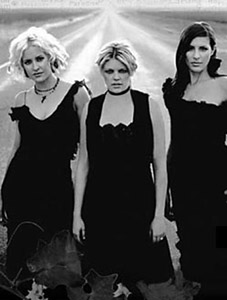![[Metroactive Music]](/music/gifs/music468.gif)
[ Music Index | Silicon Valley | Metroactive Home | Archives ]
|
Buy Dixie Chicks at CDNOW |
 The Dixie Chicks represent womanhood and Americana.
The Dixie Chicks represent womanhood and Americana.
Wide Open The Dixie Chicks' 'Home' is pretty darn good for a No. 1 record By Gina Arnold ONE OF THE MOST INTERESTING ARTICLES I read about music last year was an analysis in The New Yorker, by writer Nick Hornby, of the Top 10 on the Billboard charts for the week of July 28, 2001. Hornby is rock criticism's current (and perhaps only) superstar, thanks to the film versions of his books High Fidelity and About a Boy, but in the article he freely admits that, although a self-described music nut, he hadn't heard any of the songs in that week's Top 10 until he started writing the piece. I thought of that assertion as I listened to the new Dixie Chicks record, Home (Open Wide/Sony), which may well be one of the first No. 1 albums I've heard this year. Shocked by that realization, I then looked up the Billboard Top 10. It wasn't as bad as I'd feared--or as it had been when poor Hornby did his exercise, when the high point was a song by Melissa Etheridge. I had heard all of No. 2, The Eminem Show, also No. 4, Bruce Springsteen's The Rising, as well as songs by Nelly, Eve, Norah Jones and Avril Lavigne. The token rap release, Lord Willin' by the Clipse, is your basic dope-smokin' gangsta rap, but it's not as clichéd as most, because the Clipse comes from Virginia and is produced by the Neptunes. Home is the Dixie Chicks' third album, and although it doesn't have an obvious single like "Wide Open Spaces" (the song that helped the Chicks cross over to the pop charts and that was quite moving at the Sept. 11 tribute concert), it's a nice enough record. The mood is one of comfort and sensitivity, from the pretty cover of Fleetwood Mac's "Landslide" to a song about a kid going to Vietnam titled "Travelin' Soldier." Despite their fashion-model looks, the Dixie Chicks aren't hateful toy dolls like Faith Hill or Shania Twain. They delve into bluegrass on "White Trash Wedding" and play fiddle and guitar as well as sing and write songs themselves. "We are changing the way that we do business," says the slogan on the back cover. It's true. Because they do so much themselves, the Dixie Chicks seem like a better, more talented, more independent-minded version of the female pop trio than previous incarnations like the Supremes, En Vogue and Destiny's Child. If the Dixie Chicks represent a superidealized version of American womanhood and down-home Americana for listeners to take heart in, then Coldplay is their European counterpart: four skinny Brits whose inborn knowledge of recent history rightly and beautifully conveys a sense of horrid dread of the future. In short, the band represents the chart's token intellectual--and, thank God, we're back at a place where there even is one, because we've spent several years without. Coldplay trades in the cold, fishlike, yet yearning, quality that so many of its ilk have cashed in on. Think Radiohead, the Cure, even Genesis, and you'll get an idea of their sound: whooshing synths, crashing chords and a thin, high, sad male voice that reeks of anomie and alienation. It's a sound that tends to appeal mostly to lonely college seniors, but it's definitely of this moment, since the band's latest release, A Rush of Blood to the Head (Capitol), is informed as much by global concerns as it is by individual concerns like love. The lead-off track, "Politik," yearns for strength and inner peace while asking a lover to think about and describe her value system, while on the beautiful "The Scientist," vocalist Chris Martin sings, "Questions of science and progress / Do not speak as loud as my heart." Meanwhile, on the inside of the CD cover, the band politely asks listeners to learn more about fair-trade issues by looking at various websites. Maybe I'm reading too much into it, but the success of bands like Coldplay makes me think that music is finally getting better again. If so, it would support the theory that rock music thrives in economically hard and politically oppressive times. Put another way: when the going gets tough, the public doesn't find comfort in stupid singles by P. Diddy and Destiny's Child, as it did when Hornby was reporting.
Send a letter to the editor about this story to letters@metronews.com. [ Silicon Valley | Metroactive Home | Archives ]
|
From the September 26-October 2, 2002 issue of Metro, Silicon Valley's Weekly Newspaper.
Copyright © Metro Publishing Inc. Metroactive is affiliated with the Boulevards Network.
For more information about the San Jose/Silicon Valley area, visit sanjose.com.